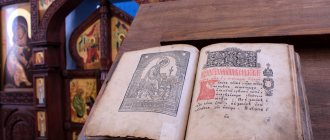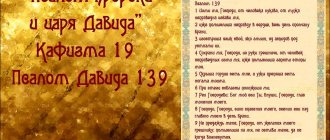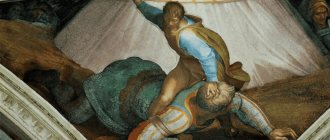"Save me, God!".
Thank you for visiting our website, before you start studying the information, please subscribe to our Orthodox community on Instagram, Lord, Save and Preserve † - https://www.instagram.com/spasi.gospodi/. The community has more than 60,000 subscribers. There are many of us like-minded people and we are growing quickly, we post prayers, sayings of saints, prayer requests, and timely post useful information about holidays and Orthodox events... Subscribe. Guardian Angel to you!
The Bible consists of a large number of different texts. Psalm 8 does not need much interpretation, since its meaning is quite clear. In its meaning it is written as a hymn of praise. Many attribute it to the pen of King David. What distinguishes it from other works is that it is filled with greatness and joy. Which are the answer to God's grace. No one can accurately determine the time of its writing, but based on the mood, one can make the assumption that this is a moment of calm in the kingdom of Judah.
Text of Psalm 8
During services in the church, prayers are said in Church Slavonic. This text is also used for personal appeal to the Lord, but for some it is difficult to understand. An alternative is Psalm 8 in Russian.
In Church Slavonic
In Russian
Interpretation of the text
According to Professor A.P. Lopukhin, the text contains words of gratitude and praise addressed to God. This is praise to the Creator for all the benefits that He generously bestows on people, for the ingenious structure of the Universe. The psalmist expresses his reverence for the Lord. God is praised by “heaven” - the holy Angels, and “earth” - people. The psalm describes the present time for the author, as well as prophecies about the end of the ages.
In the interpretation compiled by Saint Athanasius the Great, the inscription “to the end” is deciphered as an indication that the prophecy contained in the text must be fulfilled at the end of the ages.
According to the saint, in Psalm 8 the author speaks of Christ and the church after His incarnation, since He is called the vine, and the faithful - birth. If the Jews try to explain the meaning of these words as a story about man as a whole, then in this case it must be taken into account that everything was subjugated to man, since “He was made man in the image of God.” In ancient times, there was only one “foreground” - the altar in the temple. But since the pagans were called and converted, there have been many sharpening stones. They can be called churches that reap the harvest of those who are successful in godly living.
In the text, the author described the greatness of the Lord in nature
History of writing
The author of the prayer appeal is King David. His work is solemn and is the embodiment of admiration for divine powers. According to interpreters, the song was traditionally performed to the accompaniment of a Gathian musical instrument.
Psalm 8 was written after David's victory over Goliath; the king became a triumphant while still a boy. The fact that he managed to overcome a strong enemy, according to the author, is proof that he was under the protection of God.
In this work, David emphasized that everything created by the Almighty on earth was created for His glory. Children can also serve the Lord.
Music settings[edit]
| In this section do not cite any sources . |
Giovanni Gabrieli, "Domine, Dominus noster"
Psalm 8 has inspired hymn texts such as "For the Beauty of the Earth" by Folliott Sandford Pierpoint, which first appeared in 1864, and "How Great Thou Art", based on a Swedish poem written by Carl Boberg in 1885.
Michel Richard Delalande, composer for King Louis XIV, wrote an extended Latin motet setting this psalm, which was performed in the Royal Chapel of Versailles for the royal offices.
Marc-Antoine Charpentier composed around the 1670s one " Domine Deus noster" for 3 voices, 2 high instruments and continuo,
H.163.
In 1990, gospel singer Richard Smallwood staged a version of the music.
In 2022, Seth Pinnock & A New Thing recorded a song called Psalms 8, which became the first track on the album: Seth Pinnock & A New Thing Live.
The meaning of Psalm 8
Verses 1 and 2: At the beginning of the song, David expresses his admiration for the Lord, emphasizing that nothing will be hidden from his eyes. It gives a person strength and vitality. His glory rises above the seas and mountain peaks.
Verses 3-4: God's glory comes to everyone who trusts in the One Creator, not just rulers, historians, scientists. His protection makes even a baby strong. The greatest and brightest mind is not capable of understanding the secret of God’s miraculous power, his greatness. David praises the Creator, thanks for his protection and good deeds.
Verses 5-9: The King draws a parallel between man and their Creator, talking about the grace that comes to people through humility. The prayer ends with the author expressing gratitude to the Lord and exalting Him.
Literary references[edit]
To the question “What is a person?” from Psalm 8 may have inspired the reflection "What a work of art" in Shakespeare's Hamlet
.
Moore argues that Shakespeare was inspired by a paraphrase of Psalm 8 written by Henry Howard, Earl of Surrey, while he was awaiting execution in the Tower of London in late 1546 or early 1547. [12] The question also appears in Mark Twain's title. essay What Is Man?
, published anonymously in 1906. [13] The title of American writer Isaac Asimov's 1974 science fiction story, "...Thou shalt remember Him," is also taken from Psalm 8. [14]
Orthodox wedge
Author: priest Dimitry RumyantsevIn Church Slavonic
| In Russian (translation by P. Yungerov) | In Russian (synodal translation) | |
| 1. At the end, O sharpeners, Psalm to David, 8. 2. O Lord our Lord, for your name is wonderful throughout all the earth, for your splendor is taken above the heavens. 3. From the mouth of a child and those who piss, You have made praise, O Thy enemy, for the sake of destroying the enemy and the local. 4. For I will see the heavens, the works of your finger, the moon and the stars which you founded: 5. What is man, since you remember him? or son of man, because you visit him? 6. You made him less than an angel, you crowned him with glory and honor 7. And Thou didst put Thy hand over his works; Thou didst subdue all things under his nose. 8. All sheep and oxen, and also Polish cattle, 9. Birds of the sky and fish of the sea, passing paths of the sea. 10. O Lord our Lord, how wonderful is your name throughout all the earth. | 1. To the end. About sharpeners. Psalm of David. 2. Lord, our Lord! How wonderful is Your name throughout all the earth! For Your greatness is exalted above the heavens. 3. From the mouths of babes and sucklings You have made praise for the sake of Your enemies, in order to destroy the enemy and the avenger. 4. As I look at the heavens, at the works of Your fingers, at the moon and stars which You founded, 5. What is man that You remember him? Or son of man, why do you visit him? 6. You have made him a little lower than the Angels; You have crowned him with glory and honor, 7. And He made him over the works of Your hands, You put all things in subjection under His feet: 8. All sheep and oxen, and also the cattle of the field, 9. Birds of the air and fish of the sea passing through the paths of the sea. 10. Lord, our Lord! How wonderful is Your name throughout all the earth! | 1. To the head of the choir. On the gun of Gath. Psalm of David. 2. Lord our God! how majestic is Your name throughout the whole earth! Your glory extends above the heavens! 3. From the mouths of babes and sucklings You have made praise for the sake of Your enemies, in order to silence the enemy and the avenger. 4. When I look at Your heavens - the work of Your fingers, at the moon and the stars that You have set, 5. What is man, that You are mindful of him, and the son of man, that You visit him? 6. You made him a little lower than the Angels: You crowned him with glory and honor; 7. You have made him ruler over the works of Your hands; He laid everything under his feet: 8. Sheep and oxen of all kinds, and also the beasts of the field, 9. Birds of the air and fish of the sea, everything that passes along the sea paths. 10. Lord our God! How majestic is Your name throughout the whole earth! |
St. Athanasius the Great classifies the eighth psalm as one of thanksgiving and indicates the conditions for its pronunciation: “If, looking at the Savior’s grace extended everywhere and at the saved human race, you want to raise your voice to the Lord, then sing the eighth psalm.” (To Marcellinus on the interpretation of the psalms). Indeed, the entire psalm is “a song of praise to God for His blessings bestowed on man in a reasonably and beautifully ordered universe” (A .
P
.
Lopukhin. Explanatory Bible).
In the eighth psalm, in addition to its mysterious inscription (“about the grindstones”), three themes of its content can be distinguished: Glorification of God, chanting of His greatness, reflected in the world and man. Prophetic lines of verse 3 quoted by the Lord upon entering Jerusalem. A person or son of man, exalted by God in His plan for the world, having together the representative significance of pointing to the glory of Jesus Christ through His Cross and death1.
In terms of methodology, the tradition of interpreting the psalm suggests the following principle: the eighth psalm can be interpreted “in relation to the simple ordinary person. Meanwhile, by guidance, it can be explained in relation to the humanity of Jesus Christ, as the Apostle Paul understands in his Epistle to the Hebrews” (Euphemius Zigaben).
The inscription of the psalm in the Septuagint speaks of “presses”, that is, of grape presses for producing wine, but another version of the translation (probably more modern and scientific) indicates a special kind of musical instrument (see, for example, the Synodal translation). A.P. Lopukhin tries to combine both options: “the entire inscription can be understood as an indication that the said psalm is performed on a Gathian instrument during the grape harvest as a folk song” (Explanatory Bible). Nevertheless, the patristic tradition is focused precisely on the “grindstones,” which have become the object of various interpretations. Yes, darling. Theodoret understands the Church by “presses”: “The prophet calls the churches ‘presses’, because the Lord is also called the vine... Gathering grapes from it, believers prepare a mysterious wine... And the eighth psalm, inscribed about winepresses, predicts the salvation of the universe, shows God’s care for people , and predicts the incarnation of the Only Begotten” (Explanation of Psalm 8). The Christian Churches are also mentioned in the interpretation of St. Athanasius: “the psalm speaks of Christ and of the Churches after His incarnation... Ancient times in the subordinate service there was one precinct, that is, the altar in the temple; according to the calling of the pagans, they sharpened a lot, and these are the essence of the church, gathering the fruits of those who are successful in piety” (Commentary on the Psalms). Thus, along with the literal interpretation (“a psalm with such an inscription was sung either during the trampling of grapevines, or to the tune of a song to the sounds of which the grape harvest was going on”2), one can see an educational understanding of the realities of the New Testament (presses - Christian Churches), finally, in work “On the Inscription of Psalms” by St. Gregory of Nyssa can be seen as an example of allegorical moral understanding - a call to care for virtue: “What does this riddle about the grape inspire us to care about as much as possible? About enriching our treasury of the human mind, and this treasury is hope; every supply for our life is stored in it. In the same case, the property of the grapes will become known to us if first the branches are visible, and then the vine holding the grapes and branches. And this will be done according to the words of the Lord, who said: I am the vine ,
and you are branches (John 15:5).
For if, indeed, being fruitful and growing, as the Apostle says, we remain rooted in Him (Col. 2:7); then we will understand from what has been said that from us... what is required is a bunch of deeds that is not oxidized and not brought to the point of astringency by anger, has not reached the point of rottenness and has not disintegrated due to any voluptuousness. In the winepress of every soul (and the winepress is conscience), a bunch of deeds gives us wine for the next life, and everyone, as necessary, should partake of his own labors, whatever they may be. ...Therefore... remember, says the Prophet, about the sharpening stones of virtues; Yes, the winepress, according to the word of the parable, pours out fragrant wine for you (Proverbs 3:10)” (St. Gregory
of Nyssa. On the inscription of psalms. Book 2, chapter 5). Another example of an allegorical, spiritual, even more abstract explanation of the sharpening stones is the note on the eighth psalm of Evagrius of Pontus. Thus, “presses are rational natures (φúσεις λογικαὶ), bearing fruit from spiritual grapes” (Scholia in psalmos).
The first and main theme of the eighth psalm is the glorification of God, the joy of His glorious deeds. David sings of the greatness of God: How wonderful is Your name in all the earth. St. John Chrysostom solemnly, in the spirit of the Catechetical Word for Easter, lists God's blessings: “With this name, death is destroyed, demons are bound, heaven is opened, the doors of paradise are opened, the Spirit is sent down, slaves become free, enemies become sons, strangers become heirs, people become angels. What do I say: angels? God became man, and man became God; the sky took on earthly nature, and the earth accepted Him who sat on the cherubim among the hosts of angels; The mediastinum was taken away, the fence was destroyed, the divided was united, darkness was dispelled, light shone, death was swallowed up” (Conversation on Psalm 8). Connected with the glorification of God is the theme of knowledge of God based on the contemplation of His creations. St. Gregory the Theologian, in his second word on theology devoted to this topic, refers to the eighth psalm: “I contemplate not what is inside the first veil and is covered by cherubim, but one extreme and extending to us. And this, as far as I know, is that greatness, or, as the divine David calls it, that “splendor” (Ps. 8:2), which is visible in creatures created and governed by God. For all this is “God behind,” which after God gives us knowledge of Him, just as the reflection and image of the sun in the waters shows the sun to weak eyes that cannot look at it, because the vividness of the light amazes the senses” (Homily 28) . This knowledge of God, accessible to us, based on the study and consideration of His creations, comprehension of their reason and meaning, fills David with rejoicing at the greatness of God. The psalm begins and ends with wonder at the greatness of God.
The eighth psalm is called messianic primarily because it contains a prophecy about Jesus Christ, fulfilled by the exclamation of the children during the entry into Jerusalem (Matthew 21:16). Exposing the blindness of the Jews, the Lord Himself quotes the third verse of the eighth psalm: from the mouth of a child and of those who exist, you have uttered praise. St. John Chrysostom points out the exclusivity and uniqueness of this miracle: “the choir of infants spoke then for the first time. So that the Jew would not shamelessly assert that this was said about the miracles of the Old Testament, the prophet chose a sign that happened then for the first and only time” (Conversation on Psalm 8). In addition to the literal fulfillment of the extraordinary phenomenon - the children felt, recognized and glorified God, the parallels to the 8th Psalm in the New Testament endow this short text with rich content. Thus, a similar meaning is heard in the address of Jesus Christ to God the Father: “I praise You, Father, Lord of heaven and earth, that You have hidden these things from the wise and prudent and have revealed them to babes” (Matthew 11:25). Elsewhere, the Lord speaks of becoming like children as a condition for entering the Kingdom of Heaven (Matthew 18:3–4; Mark 10:15), for to such it belongs (Matthew 19:14). In the interpretation of the Bible by A.P. Lopukhin, the following explanation is given: “babies can be understood not only as infants, but also as adults, with an unspoiled and pure sense of morality, bringing them closer to children.” However, St. John Chrysostom insists on a literal understanding of the words about babies singing praises to God: “therefore, he did not just say: “babies,” so that someone would not mean by them gentle and simple people, but added: “infants,” indicating their age by indicating their food.” . The scholia of Evagrius of Pontus speak of “those who are infants for the sake of God in relation to evil.” However, such a moral explanation is worth deepening. The point is not only about moral purity - the Lord says: “if you do not convert and become like children,” that is, we are talking about a different way of perceiving life and reality, about a different worldview and sense of self in the world, a person is invited not to behave like a child, but namely to become, to live according to a different way of being. “In addition, the prophet here inspires something else, namely, that those who approach the Divine teaching should be children in their souls” (St. John Chrysostom).
The messianic meaning of the psalm is concentrated not only in the third verse, but also in the words about man, “little in honor” before the angels and crowned with glory and honor. Therefore, the entire psalm points the Christian to Jesus Christ, who reveals the perfection of man. Thus, verse 6 receives its prophetic dimension in the book of Hebrews in relation to the Lord Jesus Christ. First, the epistle, which shows the superiority of Christ over the angels, directly quotes verses 5-7 (“a certain one testified, saying...”). And, secondly, these lines of the psalm are related to Christ: “Because of the suffering of death, Jesus was crowned with glory and honor, who was made a little lower than the angels, that He, by the grace of God, might taste death for all” (Heb. 2:6– 8). The commentary of St. suggests this explanation. Athanasius: “since Paul clearly interpreted this about our Savior, we must be content with this explanation.”
Western theology represented by Bl. Augustine suggests that this passage should be understood in relation to the human nature of Jesus Christ: “But the Son of Man is first of all found in the very man of the Lord, born of the Virgin Mary. About him, because of that very weakness of the flesh, which the Wisdom of God was pleased to bear, and the humiliation of suffering, it is rightly said: You made him less than an angel. But the glorification that he achieved in heaven after the resurrection was added: with glory, he says, you crowned him with honor ,
and Thou hast placed him over the works of Thy hand
.
Since angels are also the works of God, we accept that the Only Begotten Son is placed above the angels. We believe and agree that He was made but little less than the angels through weakness due to carnal origin and suffering” (Enarrationes in psalmos PL 36 col. 114). Thus, the humiliation of man before the angels in the psalm refers to the incarnation of the Son of God. In His incarnation, He, becoming a man, was diminished in comparison with the angels. This understanding assumes that man is by definition inferior to the angels because of the flesh, corporeality, and its susceptibility to suffering.
In the late Byzantine tradition, recorded in the Explanatory Psalter of Euthymius Zigaben, it is also the body that is named as the reason for the lower status of man compared to the angels: “the first man who came into the world from the hands of the Creator possessed such perfections of nature that he was only insignificantly diminished before the angels of God, because of the gift of the body, and with it everything that pertains to the body.” This explanation means that already in paradise, by nature, man was lower than the angels, without connection with mortality and the guilt of the Fall. It can be assumed that this attitude towards the body was influenced by Platonism, characteristic of the intellectual environment of the late Byzantine period.
The ancient patristic tradition in the East is of a different nature. The words about degrading a person as a “little man” before the angels were understood not so much in relation to Christ, but in relation to man in general, to every person. Moreover, the solution to the question of the comparative dignity of man and angel is not so clear and obvious, especially after the Incarnation. The commentary of the blzh is written in this vein. Theodoret of Cyrus: “here the prophet brought to mind the definition pronounced on the crime, because man is lowered before the angels by mortality.” St. interprets in a similar way. John Chrysostom: “here the prophet mentions condemnation and ancient sin, pointing to death” (Conversation on Psalm 8). Thus, A.P. Lopukhin points out the possibility of understanding the words “little time” or “not much”, as in the Synodal translation in the sense of indicating time - “not for long”: “the expression “not much” in patristic literature is also understood in the sense of indicating for the duration of fallen man’s state of sin until his restoration through the sufferings of the Messiah.” That is, man is not diminished in comparison with the angels, but rather in their eyes, diminished from God (as other ancient translations of the psalm into Greek indicate) in comparison with his former pristine state. If we compare a person with angels, then by participating in the Eucharist, continues A.P. Lopukhin, a person “through this becomes even higher than the angels, since the latter do not partake of the Eucharist.” The words of St. John Chrysostom, focused on the glory and honor of man, both at creation and after the coming of Christ: “And this is wonderful and especially noted by him (David - Holy .
D.
_
R
.
), that a person who was awarded honor before the crime, God did not deprive him of this honor even after the sin.” And a little earlier: “And there is great glory and honor in what is in the New Testament, when a person has Christ as his head, when he becomes His body, when he becomes a brother and a joint heir and the image of His Body” (Conversation on Psalm 8). Thus, this derogation is often associated rather with the state of human nature that it acquired after the Fall. Thus, it can be noted that Eastern theology looks at human nature more optimistically and does not see insufficiency or flaw in physicality. Depreciation is not associated with humanity as such, but with mortality as a result of the Fall, but overcome in Christ.
- The glory of man in interpretations is associated with the incarnation of the Son of God: “all things were subjugated to man, because He had to become man in the image of God” (Interpretation of the Psalms of St. Athanasius).
- Miller T.A. Comments // Educational Psalter. M.: Rule of Faith, 2011. P. 665.
- The Apostle Paul repeatedly speaks about putting everything under the feet of Christ (1 Cor. 15:27) (Eph. 1:22 “He put all things in subjection under His feet, and made Him head of the Church above all”).
Bibliography
- Athanasius of Alexandria, St. Epistle to Marcellinus on the interpretation of the psalms. // Athanasius of Alexandria, St. Creations. In 4 vols. T. IV. M.: 1994. S. 3–35.
- Athanasius of Alexandria, St. Interpretation of the Psalms. // Athanasius of Alexandria, St. Creations. In 4 vols. T. IV. M.: 1994. P. 40–422.
- Gregory the Theologian, St. Collection of creations. In 2 volumes. Minsk; M., 2000. T. 1.
- Gregory of Nyssa, St. On the inscription of psalms. M.: Publishing house named after. St. Ignatius of Stavropol, 1998.
- Efimy Zigaben. Explanatory Psalter of Efimius Zigaben (Greek philosopher and monk). Explained according to patristic interpretations. Per. from Greek Rep. [B. m., b. G.].
- John Chrysostom, St. Conversations on the Psalms. M.: Spassky Brotherhood, 2013.
- Theodoret of Cyrus, bl. Psalter with explanation of each verse / by Blessed Theodoret, Bishop of Cyrus. M.: Holy Trinity Publishing House, 2011.
- Lopukhin A.P. Explanatory Bible. Interpretation of the Psalter. https://azbyka.ru/otechnik/Lopuhin/tolkovaja_biblija_22/8.
- Miller T.A. Comments // Educational Psalter. M.: Rule of Faith, 2011. pp. 656–797.
- Augustinus Aurelius. Enarrationes in psalmos. PL 36. www.documentacatholicaomnia.eu.
- Evagrius Ponticus. Scholia in psalmos. https://www.ldysinger.com/Evagrius/08_Psalms/.
Source: www.mepar.ru
Interpretation of the Psalms. Psalm I Interpretation of the Psalms. Psalm II Interpretation of the Psalms. Psalm III Interpretation of the Psalms. Psalm VI Interpretation of the Psalms. Psalm V Interpretation of the Psalms. Psalm VII
Reproduction on the Internet is permitted only if there is an active link to the ORTHODOX WEDGE website. Reproduction of site materials in printed publications (books, press) is permitted only if the source and author of the publication are indicated.
Sources [edit]
- Nahin, Paul J. (2014). Holy Sci-Fi!: Where Science Fiction and Religion Intersect. Springer Science & Business Media. p. 86. ISBN 978-1493906185.
- Sherman, Rabbi Nosson (1985). Full ArtScroll Machzor - Rosh Hashanah
. Published by Mesorah Publications, Ltd. ISBN 0-89906-676-3. - Sherman, Rabbi Nosson (1986). The Complete ArtScroll Siddur
(2nd ed.). Published by Mesorah Publications, Ltd. ISBN 0-89906-650-X. - Wright, Terry R. (2016). The Genesis of Fiction: Modern Novelists as Expositors of the Bible. Rutledge. ISBN 978-1317030768.
Links[edit]
- "Parallel Latin/English Psalter/Psalm 8". Archived from the original on September 30, 2022. Retrieved July 18, 2022.
- ^ ab Spurgeon, Charles (2019). "Psalm 8 Bible Commentary". Christianity.com
. Retrieved August 4, 2022. - "Midrash Tehillim/Psalms 8" (PDF). matsati.com
. April 2022. Retrieved August 4, 2022. - ^ a b c d Brauner, Reuven (2013). "Shimush Pesukim: A Comprehensive Index to the Liturgical and Ceremonial Uses of Biblical Verses and Passages" (PDF). halakhah.com
(2nd ed.). paragraph 32. - Scherman 1985, p. 488.
- Scherman 1986, p. 730.
- ^ abc Kirkpatrick, A. F. (1901). The Book of Psalms: With Introduction and Notes. Cambridge Bible for Schools and Colleges. Book IV and V: Psalms XC-CL. Cambridge: University Press. item 838. Retrieved February 28, 2022.
- New Testament Theology: Magnifying God in Christ Thomas R. Schreiner P214
- Prosper Guérange, Règle de Saint Benoit, Traduction, (Abbey of Saint-Pierde Solesmes, réimpression 2007) P46.
- The main cycle of liturgical prayer lasts four weeks.
- "Apollo 11 Goodwill Messages" (PDF). NASA
. July 13, 1969. Retrieved February 26, 2022. - Moore, Peter R. (July 1998). "Hamlet and Surrey Psalm 8". Neophilologist
.
82
(3):487–498. DOI: 10.1023/A: 1004290421852. - Wright 2016, p. 36.
- Nahin 2014, p. 86.






